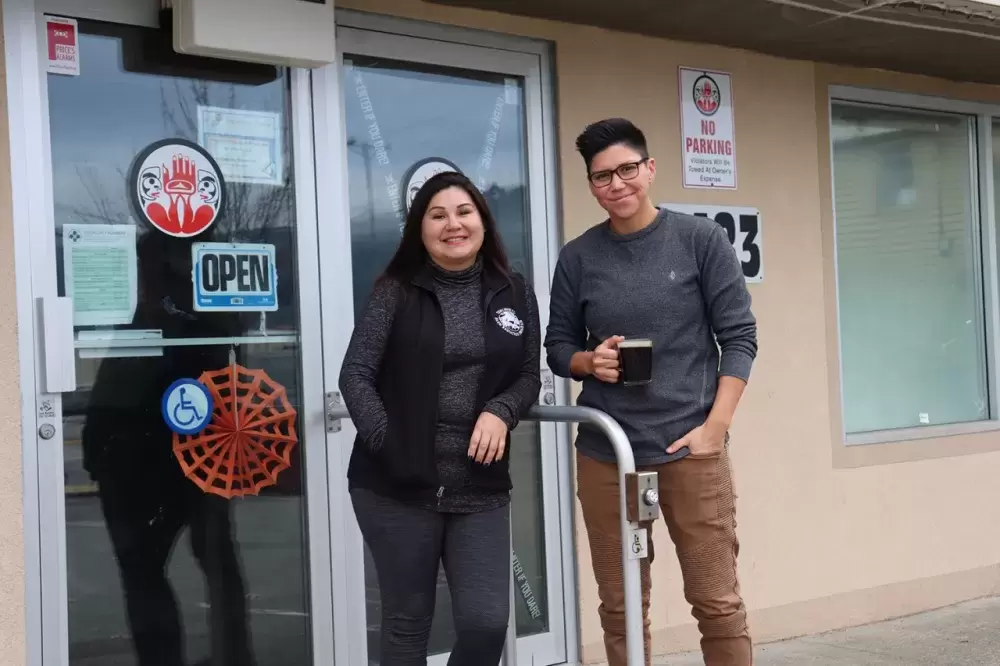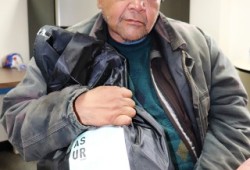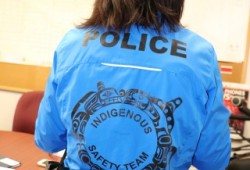Homeless people, you see them everywhere, pushing shopping carts filled with their treasured belongings. They congregate around upper Third Avenue in Port Alberni accessing free food, clothing and services. They are also down on lower Fourth Avenue, selling the empty beverage containers they worked hard to collect – or they may be hitting up the Safe Injection Site after a visit to their dealers.
RCMP Constable Beth O’Conner says there are people of all ages in Port Alberni’s homeless population. The increasing number of youth is alarming. They estimate there are 300 to 400 people on the streets in Port Alberni.
The reasons for homelessness are many. The shortage of affordable housing tops the list but there are also the issues of addiction and poverty.
The theme of the September 2019 NTC AGM, hosted by Ahousaht First Nation, was homelessness. Irene Robinson, Quu’asa Outreach Wellness Worker, said it is nice that the leaders gathered to talk about it but wondered if there will be action.
Robinson goes out and visits service organizations in Port Alberni, networking and looking for ways to help. She will go to the courthouse, the college, the Safe Injection Site, the Sobering House, the shelters, anywhere she might find people that need help.
Gina Amos is a Harm Reduction Outreach worker for Teechuktl (Mental Health), a program that operates under the umbrella of the Nuu-chah-nulth Tribal Council. In recent weeks Gina spoke with 53 homeless Nuu-chah-nulth-aht living in the streets of Port Alberni.
“These are truly homeless people – they are not couch surfing, they are not in a shelter, they are completely homeless,” she told Ha-Shilth-Sa.
Amos believes that if they added the ones that are homeless part-time, or the ones in shelters or those that are couch surfing the numbers would triple or quadruple. Many people that are homeless struggle with addictions.
The opioid crisis and rising thefts
RCMP Inspector Brian Hunter points to the opioid crisis as the leading factor for the skyrocketing theft rates in Port Alberni. He reported that general theft has gone up 80 percent while theft from vehicles has jumped to 135 percent.
He suggested both federal and provincial governments need to invest in mental health and rehabilitation programs as step in the right direction.
There is a second stage sober living facility in Port Alberni called New Leaf. It is safe place to stay after clients have gone through stage one - detox.
But according to Kim Erickson, a family development counsellor and acting Quu’asa supervisor, there is no stage one detox facility in Port Alberni. So how do people get to stage two sober living without a place to detox?
“Some come from out of town, some detox on their own,” said Erickson.
John Paul is a middle-aged Ahousaht man. He was living comfortably in a home with a roommate until Jan. 4, 2019, when an altercation took place that led to his immediate eviction. He says his belongings were thrown out and he has been on the street ever since.
He was able to stay relatively comfortable over the warmer months, sleeping under tarps in nearby forests. He was still collecting disability up until three months ago, when he was cut off for not having a fixed address.
Paul says he now sleeps wherever he can, usually in the bush. He is bundled in thick, black clothing. He is painfully aware that he smells bad and he apologizes for it, but he hasn’t been able to find a place to shower or wash his clothes.
His hair is stringy and oily; his eyes are puffy with large bags underneath. His hands tremble as he takes the warm breakfast sandwich and wolfs it down with grateful moans.
“I haven’t had a hot meal in a long time,” he tells Ha-Shilth-Sa.
He says he hangs out with a few buddies and they help each other out. They will collect empties and share food. They used to huddle under the Kitsuksis Bridge at night until they were kicked out.
Paul doesn’t like sharing where he’s sleeping at the moment – it’s about safety.
“My buddy Henry and I take turns sleeping,” he says.
He began talking about injuries to his hands.
“Well, it’s my own fault,” he said, “I shouldn’t have fallen asleep after eating that peanut butter sandwich.”
Paul said he woke to rats biting his peanut-butter-smeared hands.
Paul said he usually gets his meals from dumpster diving. He suffered a case of food poisoning and spent three days in the hospital recovering from that. Minutes after eating the breakfast sandwich he was given he became ill and was taken to the hospital.
Street level outreach
RCMP Constable Beth O’Conner is part of the Indigenous Safety Team (IST) in Port Alberni. The IST is a joint engagement of healthcare, social services, culture and justice that seeks to improve the lives of Port Alberni Indigenous community.
Launched by the Indigenous Policing Section of the RCMP, IST is a street-level outreach program where partners, including the RCMP and outreach workers from other agencies, connect with high-risk, vulnerable Indigenous people in the streets.
There are no solid numbers for how many people are homeless in Port Alberni.
“Some people stay in shelters when they can, some couch surf, some come and go to other communities,” said O’Conner.
Adding to that are the belief systems of some of the people. If they have somewhere warm to stay, even if it’s temporary, they don’t consider themselves homeless.
Paul says he hasn’t had his own place for 11 months. On the colder nights, like the frosty October mornings Port Alberni has had, they will stuff their clothes with free newspapers.
“I witnessed my buddy get stabbed,” he tells Ha-Shilth-Sa. He said “druggies” from the other side of town attacked them for their clothes.
Paul had been given a fresh, clean, sleeping bag just a few days before but it was stolen.
Why are they homeless? Amos says there are many reasons.
“Residential school, day school, the TB hospital, the ‘60s scoop to name a few,” she said. It all ties into a lack of culture – a sense of not knowing who you are or where you belong, she added.
“People carry what happened to them in residential school,” said Irene Robinson, Quu’asa outreach wellness worker, adding that they were told nobody wants them, nobody loves them. “They carried blame for abuse; they felt unloved, dirty and unworthy.”
Following the days of institutionalization many left home, becoming urbanized. The adult residential school survivors had no parenting skills and that was often passed onto the next generations.
“There was a huge disconnection,” said Robinson, adding that there was nothing cultural in the cities. “It all ties into colonization, systemic racism, and a feeling of hopelessness.”
People with low self-worth, with trauma that went on at home, don’t want to go home. They often turn to addictions to numb the pain.
O’Conner concurs.
“It’s the power of trauma, the power of opioids,” she said.
Reconnecting with family, culture and community
All agree that reconnecting the people with their families, their communities and their cultures is part of the solution.
And that’s what John Paul wants to do.
“I just want to go home but nobody will pick me up,” he says after spending all night trying to hitch a ride.
Even if he does make it home Paul doesn’t know if he will be welcome or if he would have a place to stay. He says he was accused of a crime he says he didn’t commit.
“My name has been cleared though” in the past few months, he said.
Paul was in a four-month course at the local college over the summer.
“It was warmer and the school let me have a locker where I could keep my stuff and I got to use the shower there,” he said.
But after earning his red seal ticket in janitorial work he hasn’t been able to find a job, not in his present condition. He denies active addiction, but admits to drinking the occasional beer, otherwise, he says, he couldn’t handle the cold. He says hard liquor is too hard on his stomach.
It was stomach issues that sent him to emergency. Paul said he was treated for food poisoning and released. He recalls finding a sandwich that looked real good in a dumpster near a fast food restaurant. That was his dinner the night before.
He took a few bottles of water from Quu’asa and went to a convenience store for hot chocolate with a gift of change he received.
Connecting in a non-threatening way
It is people like John Paul that the IST program can help. Cst. O’Conner says the IST approach is to talk to the individuals and to their respective First Nation and come up with a tailored approach to help the situation.
The Teechuktl outreach workers are teaming up with the RCMP’s IST along with other support workers in Port Alberni to connect one-on-one with homeless people in a non-threatening way.
“We have a triage system and we go to where drugs are an issue,” said O’Conner, adding that they will go to the Safe Injection Site, lower 4th Avenue and into the bush where the homeless encampments are. They are easily recognized as IST personnel by their blue jackets.
O’Conner noted that there are several service agencies that have been in operation in Port Alberni and have been networking for years but there are some gaps.
“There are some people not using the services that they could be getting and we try to identify those gaps,” she said.
Sometimes there are people with mental health issues or they may become violent due to drug or alcohol abuse. When that happens, safety becomes an issue for outreach workers, O’Conner noted.
“It’s a Band-Aid solution, I know, but it’s the best one we have,” O’Conner said. IST workers focus on reaching out to the homeless people and help them access the services they can be getting from government and from their First Nations communities. “We want to help them overcome the barriers,” said O’Conner.
Another issue is trust. Amos said that a lot of Indigenous people don’t trust authority. The RCMP is working to change that dynamic.
“Constable O’Conner is giving tents out now and the police are letting them live where they are for now,” Amos noted.
Gina brings out clean drug supplies and condoms to help reduce risk of disease transmission. She will help people access their prescription medication or will transport them to medical appointments.
“Whatever I can do to be supportive,” she says, which includes referrals, to treatment or other supportive services.
“The tough one is no address,” she said, adding that often people want to go to treatment but when they’re homeless, they don’t have the required address to get in.
For now, the NTC support workers are doing what they can to connect with the people and help in whatever way they can.
Amos says she likes to take people to sit by the river and just talk.
“We help them connect to their communities, to teachings of their families,” she says. “I might ask them if they know any of gramma’s bannock recipes, or we talk about their family back home.”
“Be kind, generous and loving to people, that is part of our culture,” said Robinson adding that the local homeless people are a community. “They look after each other, they share their food if someone is hungrier than they are.”
There are people who help.
An Ahousaht woman, who has little money of her own, bakes bannock and treats and gives it away to the people at lower Fourth Avenue. She will collect recyclables to buy baking supplies.
A Tseshaht man and his friends are organizing a clothing drive and dinner. According to Amos, Ed Ross is doing a clothing drive and is planning a lunch and dinner for the homeless. They are also looking for donations for the Bread of Life, a non-profit organization that serves free breakfast and lunch seven days a week in Port Alberni.
Erickson says Quu’asa sometimes hosts a hot dog roast during the longer months.
“When people say it’s a long stretch to cheque day we will help,” she added.
Part of Amos’ job is to help people with shopping on cheque day. She encourages them to buy what they like to eat, otherwise they might not buy groceries at all.
“Buying $100 worth of groceries is $100 less going to the drug dealer,” she said.
“I just connect with people,” says Amos, adding that she loves her job, and it is working. “I helped one woman reconnect with her family.”
Now, according to Amos, that woman is helping other family with addictions.
“Everyone is born with a seed, Quu’asa is the water to that seed,” she said.
Quu’asa collects donations for the homeless. They are looking for donations of socks, blankets, sleeping bags, toques and food.










